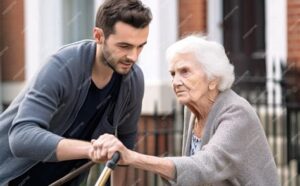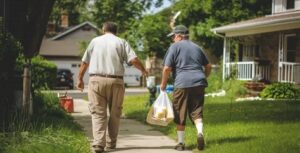I Told Him I Was Scared to Live Here — His Answer Changed Everything
I never intended to move into that neighborhood. But three weeks after my husband passed away, drained by medical bills and funeral costs, I had no other choice. The rent was shockingly low—too good to be true. It didn’t take long to understand why.
On my first day, a massive man with tattooed arms and clearance‑rack sneakers crossed the street toward me. I froze, clutching my purse as if it could shield me from danger.

Then he spoke in a calm, surprising tone:
“You alright, ma’am?”
I admitted the truth:
“I don’t feel safe here.”
He glanced around thoughtfully, then said,
“I get that—most people don’t. That’s why I stay out here—so folks like you don’t have to walk alone.”
Without hesitation, he took one of my bags and offered to walk me home. We made the short walk in near silence. At my door I asked:
“Why do you do this?”
He shrugged.
“Someone did it for my mom. Changed her life. Changed mine.”
Then he simply walked away. For the first time since moving in, I wasn’t completely alone.
That evening, I opened the blinds wider.
The next morning, a paper bag sat on my porch. A note:
“Fresh from Miss Anita’s—start with the peach scone.”
Inside, warm pastries. No signature — but I knew who it was.
Over the following days, I saw him everywhere.

Helping seniors with groceries, chatting with teens, intervening calmly in a street fight. I asked the corner store owner.
“That’s Marcus,” she said. “Lives two blocks over. Been through hell.”
When I asked what kind of hell, she explained: Marcus lost his dad young, got tangled up in trouble, but turned things around. He studies at night and works part‑time at the rec center, giving back to the neighborhood that raised him.
I brought him banana bread at the rec center one day. He grinned sheepishly when I gave it:
“Busted.”
We stayed and talked, and gradually built friendship.
I quickly discovered he was only 28—but carried wisdom beyond his years. His little sister, Leila, was 17 and about to graduate. He stopped by to fix a flickering porch light, refusing payment. We drank tea—and that became a pattern: he’d check in, I’d cook warm food.
One night I called him. A woman across the street was screaming. A man was brandishing a bottle. Marcus walked right between them and de‑escalated everything.
The next morning, the woman was having coffee on his porch with Leila.

He wasn’t just helping people—he was holding the neighborhood together.
Then Marcus vanished.
No texts. No calls. Until Leila came by:
“He got jumped coming home. They stole his phone and wallet. He fought back—beat him up pretty bad.”
I dropped off bread and flowers at the hospital. Despite a swollen face and a sling, he managed a smile:
“Turns out I’m not bulletproof,” he rasped.
I told him,
“Then let someone else handle things for now.”
He looked at me.
“Yeah… but who?”
I knew in that moment: It would be me.
